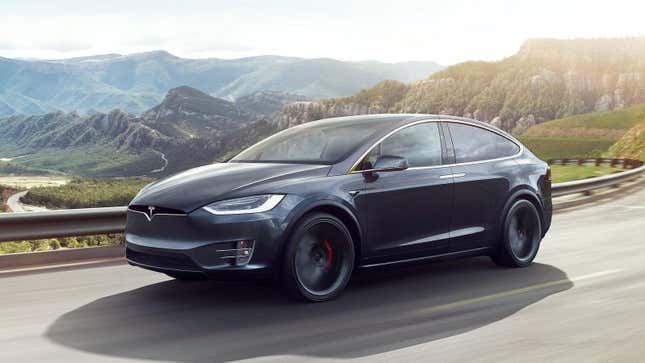
Elon Musk is, of course, the worst thing about Tesla. The board will never do anything about him, but if you like Tesla’s cars, the best thing that could possibly happen to that company would be for Elon to finally fuck off to Mars. That said, the cars themselves aren’t without their flaws, either. Like when a driver killed a pedestrian with Tesla’s so-called “Full Self-Driving” feature activated, leading the National Highway Transportation Safety Administration to open a new investigation, CNBC reports.
The case in question is a little more complicated than a simply “car hits pedestrian,” but it does highlight several of the reasons autonomy isn’t nearly as close as the average person on the street probably thinks. As the previously mentioned crash hasn’t been the only one to occur in similar circumstances, NHTSA wants to evaluate how FSD works in “reduced roadway visibility conditions,” such as fog or glaring sunlight.
You would hope that Tesla owners would be responsible enough to avoid using FSD in heavy rain or during a blizzard, but the glare from the setting sun and occasional fog are all much more common occurrences, potentially putting everyone on the road in danger if Tesla’s camera-based driver-assistance tech can’t handle a little direct sunlight.
NHTSA has since released records indicating that it’s aware of at least four crashes related to reduced visibility, including the one that killed the pedestrian and prompted the Office of Defects Investigation to give FSD a closer look. As the records show:
The Office of Defects Investigation (ODI) has identified four Standing General Order (SGO) reports in which a Tesla vehicle experienced a crash after entering an area of reduced roadway visibility conditions with FSD -Beta or FSD -Supervised (collectively, FSD) engaged. In these crashes, the reduced roadway visibility arose from conditions such as sun glare, fog, or airborne dust. In one of the crashes, the Tesla vehicle fatally struck a pedestrian. One additional crash in these conditions involved a reported injury
The ODI’s preliminary investigation covers all Teslas sold in the U.S. that can or could use FSD, including the Cybertruck, which brings the total to just short of 2.5 million vehicles. According to the records, ODI will look into:
- The ability of FSD’s engineering controls to detect and respond appropriately to reduced roadway visibility conditions;
- Whether any other similar FSD crashes have occurred in reduced roadway visibility conditions and, if so, the contributing circumstances for those crashes; and
- Any updates or modifications from Tesla to the FSD system that may affect the performance of FSD in reduced roadway visibility conditions. In particular, this review will assess the timing, purpose, and capabilities of any such updates, as well as Tesla’s assessment of their safety impact.
It isn’t entirely clear what NHTSA’s solution will be if it determines that FSD can’t safely handle reduced visibility, but if there’s ever a time for the federal government to aggressively dig into what Tesla’s doing and just how unsafe its software really is, it’s right after Musk announced plans to begin selling $30,000 self-driving cars that will work as robotaxis by the end of 2026. Those so-called robotaxis don’t have any manual controls, so you better pray they’re so good they never make a mistake, or the government has the intestinal fortitude to tell Tesla to fuck off until it comes back with a self-driving car that can safely operate on public roads in any remotely reasonable weather scenario.
Of course, since this is Tesla we’re talking about, everyone knows the 2026 launch isn’t happening. Well, except for the credulous rubes on Wall Street who actually deluded themselves into thinking Musk would actually show up to his “We, Robot” event with cars capable of actual SAE Level 5 autonomy. Remind me again why those people still have jobs?